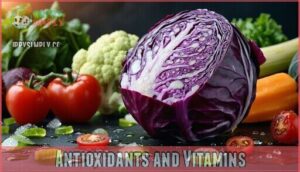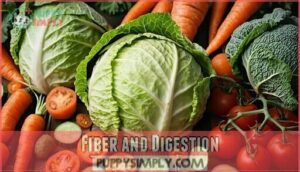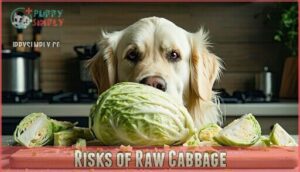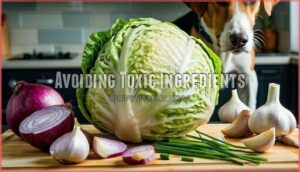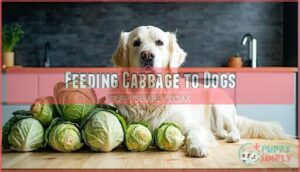This site is supported by our readers. We may earn a commission, at no cost to you, if you purchase through links.
 Yes, dogs can eat raw cabbage, but it’s best to offer it in moderation.
Yes, dogs can eat raw cabbage, but it’s best to offer it in moderation.
Raw cabbage is packed with vitamins like K and C, fiber, and antioxidants, which can boost your dog’s health.
However, too much can cause gas or bloating, so keep an eye on your pup’s reaction.
Chop it into small pieces to avoid choking and make it easier to digest.
Another thing to watch for is thiocyanate, a compound in cabbage that might affect your dog’s thyroid if eaten in large quantities long-term.
Curious about how to prepare it safely?
There’s more to explore on proper serving tips!
Table Of Contents
- Key Takeaways
- Can Dogs Eat Cabbage
- Can Dogs Eat Raw Cabbage
- Benefits of Cabbage
- Risks of Raw Cabbage
- Preparing Cabbage for Dogs
- Feeding Cabbage to Dogs
- Frequently Asked Questions (FAQs)
- How much raw cabbage can a dog eat?
- What are the side effects of cabbage for dogs?
- What is the best vegetable for dogs?
- Can a dog eat a whole head of cabbage?
- How much cabbage should my dog eat?
- Can puppies eat cabbage?
- Is cabbage okay for dogs with sensitive stomachs?
- Are there any health risks associated with feeding cabbage to dogs?
- What are the best ways to feed cabbage to my dog?
- Can raw cabbage impact medication effectiveness in dogs?
- Conclusion
Key Takeaways
- Raw cabbage is safe for dogs in small amounts but can cause gas or bloating if overfed.
- Chop cabbage into bite-sized pieces to prevent choking and aid digestion.
- Its thiocyanate content might impact thyroid function, so moderation is critical.
- Start with small portions and monitor your dog’s reaction to avoid digestive issues.
Can Dogs Eat Cabbage
Yes, dogs can eat cabbage, but you should feed it to them in small amounts.
While it’s a safe and nutrient-rich option, moderation is key to preventing digestive issues like gas or an upset stomach.
Safety Guidelines
Cabbage is safe for dogs, but only in small quantities as an occasional treat.
Always consult a veterinarian to confirm it’s suitable, especially for dogs with health issues.
Watch for adverse reactions like gas or upset stomach. Breed considerations matter too; some dogs are more prone to cabbage risks.
Proper preparation and monitoring make cabbage a safer choice.
Nutritional Benefits
Raw cabbage offers plenty of benefits for dogs when served in small amounts.
Its vitamin density, including vitamins C and K, supports immune boost and overall dog health.
Packed with fiber, it aids digestion, while its mineral content, like potassium, promotes energy.
Red cabbage contains even more nutrients, making it a nutritious, low-calorie addition to their diet, and is particularly notable for its mineral content.
Potential Risks
While cabbage packs nutritional benefits, it has some pitfalls.
Eating too much can cause gas production, leading to bloating. Some dogs might face thyroid interference from compounds in cabbage, raising health concerns.
Bloat potential is higher in breeds prone to gas. Cabbage risks dogs with sensitive stomachs, causing upset stomachs or diarrhea.
Rarely, a cabbage allergic reaction may occur. One way to counter this is with healthy gut probiotics. Always consult your vet to ensure the best course of action for your dog’s specific needs, considering the potential for gas.
Can Dogs Eat Raw Cabbage
If you’re wondering about feeding dogs cabbage, raw cabbage dogs can eat should be approached carefully.
While it offers nutrient retention and can be safe in small amounts, raw digestibility can be tricky for your pet’s stomach.
Dogs may struggle with its tough, fibrous texture, leading to a constipation risk or minor digestive discomfort.
A safer option is pureed cabbage, which makes it easier to digest while keeping its nutritional value intact.
However, start slow—too much raw cabbage increases the chance of gas, which might leave your dog feeling bloated or uncomfortable.
Always monitor reactions when introducing new foods.
Cabbage also provides essential vitamins like Vitamin C, which can help reduce inflammation.
Is cabbage safe? In moderation, yes.
Raw can be okay for healthy adult dogs, but cooked options often provide similar cabbage benefits dogs without added risks.
Benefits of Cabbage
When fed in moderation, cabbage can provide your dog with valuable nutrients like vitamins, fiber, and antioxidants.
It’s a low-calorie treat that may support digestion, immune health, and overall well-being.
Antioxidants and Vitamins
You’d be surprised how much cabbage benefits dogs.
Packed with antioxidants and vitamins, it boosts the immune system and protects cells from damage.
Red cabbage contains more nutrients than green, offering immune-boosting benefits and beta-carotene for healthy skin and eyes.
Plus, vitamin K supports blood health, while magnesium aids muscles.
These features make cabbage nutrition for dogs undeniably valuable.
Fiber and Digestion
Cabbage can contribute to dog digestion due to its high fiber benefits.
Cabbage’s high fiber content supports digestion, promoting healthier stools and a happy gut for your furry friend.
It supports stool consistency and gut microbiome health.
However, raw digestibility can be challenging for some dogs, so cooking effects, like steaming or boiling, may ease digestion.
Fiber is essential for dog digestive health but introduce it gradually to avoid unsettling their system.
Low-Calorie Content
If you’re watching your pup’s weight, raw cabbage can help. It’s a low-calorie veggie that supports weight management without guilt.
Plus, it adds a healthy crunch to their diet!
Remember:
- Cabbage has fewer calories compared to many snacks.
- It’s a great treat alternative.
- Helps with obesity prevention when portions stay small.
- Makes portion control simple for a balanced diet.
The key benefits of cabbage make it an excellent choice for a healthy crunch in your pup’s diet.
Risks of Raw Cabbage
Feeding your dog raw cabbage can lead to gas, bloating, or even digestive discomfort due to its high fiber content.
It also contains compounds that may affect the thyroid and pose choking hazards if not properly prepared.
Gas Production
Raw cabbage can cause gas production, leading to potential flatulence or bloat in dogs. Certain breeds, like Great Danes, are more sensitive.
Certain breeds, such as Great Danes, are especially sensitive to raw cabbage, which can cause uncomfortable bloating and excess gas production.
Cooking effects can reduce this risk, but quantity matters—too much raw cabbage overwhelms digestion.
A gradual introduction helps limit discomfort.
Like cabbage, spinach contains nutrients, but oxalic acid is a concern.
| Issue | Impact | Breeds Affected | Prevention | Solution |
|---|---|---|---|---|
| Gas Production | Flatulence, bloat | Bloat-prone breeds | Moderate portions | Limited serving size |
| High Fiber | Digestive upset | Sensitive stomachs | Cook cabbage | Small amounts |
| Raw Texture | Hard to digest | All breeds | Gradual introduction | Steaming before use |
| Gas Sensitivity | Increased flatulence | Large dog breeds | Monitor reactions | Reduce raw servings |
| Feeding Method | Overfeeding risks digestion | All dogs | Divide into small meals | Incorporate sparingly |
Thyroid Issues
Raw cabbage contains thiocyanate, which can interfere with thyroid function by blocking iodine uptake.
For dogs with hypothyroidism, even small amounts may worsen symptoms like sluggishness or weight gain.
Cooking cabbage reduces thiocyanate levels, making it safer.
Always consult a vet first, especially if your dog’s on medication or has thyroid concerns.
Moderation is key to avoiding goitrogen issues.
Choking Hazards
Large pieces of cabbage can pose a choking hazard for dogs, especially puppies and smaller breeds with chewing difficulties.
To prevent emergencies, always follow portion guidelines by cutting cabbage into bite-sized pieces.
Certain breeds are prone to choking, so take extra care. If your dog struggles or shows signs of distress, act quickly and seek emergency action to avoid digestive upset and ensure your dog’s safety is a top priority.
Preparing Cabbage for Dogs
When preparing cabbage for your dog, always wash it thoroughly and remove the tough stem and core.
Cook it plain by steaming or boiling, and cut it into small, bite-sized pieces to guarantee safe and easy digestion.
Cooking Methods
For cabbage preparation for dogs, steaming cabbage is the best method, as it keeps the nutrients intact.
Boiling effects lead to some nutrient loss but softens the texture, aiding digestion. Roasting cabbage works too, as long as it’s plain. Pureeing cabbage can also improve digestibility.
One should also be aware that oxalic acid presents risks for dogs. Always provide cooked cabbage in moderation, as part of a safe, balanced dog diet.
Serving Sizes
Serving raw cabbage to dogs requires caution and proper portion control.
Tailor cabbage amounts to your dog’s weight and breed:
- Extra-small dogs: 1 teaspoon or less.
- Small dogs: 1–2 teaspoons.
- Medium dogs: 1 tablespoon.
- Large dogs: 2 tablespoons.
- Extra-large dogs: ¼ cup.
Consider appropriate portion sizes for ideal canine health. Introduce cabbage gradually, limiting treat frequency to once or twice weekly for moderation.
Avoiding Toxic Ingredients
When preparing cabbage for dogs, avoid toxic seasonings like salt, butter, or spices. Ingredients like garlic, onions, and chives are harmful and can cause toxicity.
Consider safe alternatives like plain, steamed cabbage. Knowing what to avoid can help prevent potential poisoning incidents.
Cooking helps reduce thiocyanate levels, lowering risks for your pet. Always double-check for onion dangers in meals, as even trace amounts can harm your dog’s health, and be aware of potential poisoning incidents.
Feeding Cabbage to Dogs
When feeding cabbage to your dog, start with small amounts and watch for any changes in digestion or behavior.
Always check with your veterinarian beforehand to confirm it’s safe for your pet.
Monitoring Digestive Health
After cooking cabbage plain and serving it safely, keep an eye on your pup’s stool consistency, gas frequency, and appetite changes.
Watch for vomiting signs or bloating symptoms, as cabbage upset stomach isn’t unusual. Excess gas in dogs or diarrhea could hint it’s not sitting well.
Properly managing dog gastrointestinal health keeps meals enjoyable and your dog digestion cabbage-friendly. This approach helps prevent issues like excess gas.
Introducing Cabbage Gradually
When adding cabbage to your dog’s diet, start small.
A teaspoon-sized portion works well for first-timers, especially puppies.
Small servings help with digestive adaptation and let you monitor reactions like gas or bloating.
Gradual increases can follow if your dog handles it well.
Always keep cabbage serving size reasonable to avoid overwhelming their digestion.
Consulting a Veterinarian
Veterinarian consultation is essential when feeding cabbage to dogs, especially with prescription diets, breed predispositions, or medication interactions.
A vet can assess specific concerns, like underlying conditions or thyroid issues, and provide personalized advice.
Veterinary advice guarantees cabbage fits your dog’s diet safely, avoiding complications.
It’s always better to seek vet advice before introducing new foods, like cabbage, for peace of mind.
Frequently Asked Questions (FAQs)
How much raw cabbage can a dog eat?
Crunch carefully, cabbage can be safe for your dog, but stick to small amounts like a teaspoon for tiny pups or a few shredded leaves for larger breeds.
Too much can upset their stomach.
What are the side effects of cabbage for dogs?
Feeding cabbage to your dog can cause gas, bloating, or upset stomach if given in large amounts.
Raw cabbage is harder to digest, and excessive intake may irritate the thyroid or lead to digestive discomfort.
What is the best vegetable for dogs?
Carrots, green beans, and sweet potatoes are among the best vegetables for dogs.
They’re safe, nutritious, and easy to digest.
Always introduce new veggies gradually, cooked plain, and diced small to avoid choking risks.
Can a dog eat a whole head of cabbage?
A whole head of cabbage is too much for a dog.
Eating it could lead to stomach upset, gas, or even bloating, which can be dangerous.
Always serve cabbage in small, manageable portions.
How much cabbage should my dog eat?
Your dog can have cabbage in small amounts, usually a teaspoon for small dogs and up to a few tablespoons for larger breeds.
Start slow, watch for gas or discomfort, and avoid seasoning or additives.
Can puppies eat cabbage?
Puppies can eat cabbage, but it’s best to wait until they’re fully grown.
Start with small amounts, cooked and plain, to avoid digestive issues.
Always talk to your vet before adding cabbage to their diet.
Is cabbage okay for dogs with sensitive stomachs?
Cabbage can be okay for dogs with sensitive stomachs if introduced slowly and in small amounts.
Stick to cooked, plain cabbage since it’s easier to digest.
Always watch for signs like gas or discomfort, and remember to introduce cabbage slowly.
Are there any health risks associated with feeding cabbage to dogs?
Feeding cabbage to dogs can be a double-edged sword.
While safe in small amounts, too much can cause gas, bloating, or upset stomach.
Its thiocyanate content may also affect thyroid function if overfed.
What are the best ways to feed cabbage to my dog?
Introduce cabbage slowly by steaming or boiling it plain, without any seasonings.
Cut it into small, bite-sized pieces to avoid choking.
Mix it as a meal topper, and always watch for digestive upsets.
Can raw cabbage impact medication effectiveness in dogs?
Like a hidden thread in a sweater, raw cabbage might alter how your dog’s medication works.
Its thiocyanate content can impact thyroid function, so always check with your vet before adding it to their diet.
Conclusion
Wondering if dogs can eat raw cabbage? Yes, but moderation is key.
This crunchy veggie offers vitamins, fiber, and antioxidants, which boost your dog’s health.
However, too much raw cabbage can lead to gas or bloating, and its thiocyanate compound might affect thyroid function over time.
Always chop it into small pieces to prevent choking, and monitor your dog’s reaction.
Safely introducing raw cabbage, while avoiding excessive amounts, guarantees your furry friend reaps the benefits without risks.
- https://www.dogsnaturallymagazine.com/can-dogs-have-cabbage/
- https://www.petco.com/content/content-hub/home/articlePages/food-nutrition/can-dogs-eat-cabbage.html
- https://www.chewy.com/education/dog/food-and-nutrition/can-dogs-eat-cabbage
- https://www.whole-dog-journal.com/food/can-dogs-eat-cabbage/
- https://www.dogcancer.com/articles/diet-and-lifestyle/cabbage-for-dogs/


